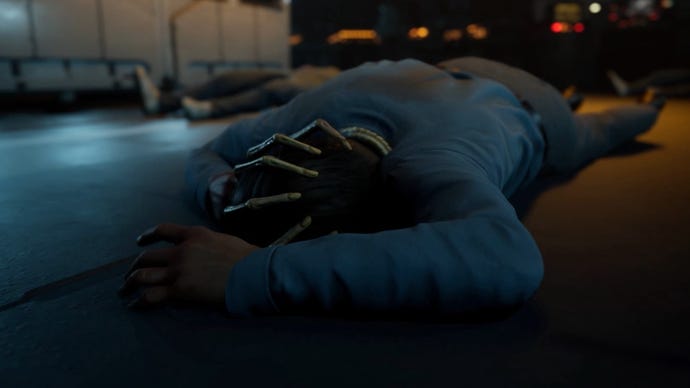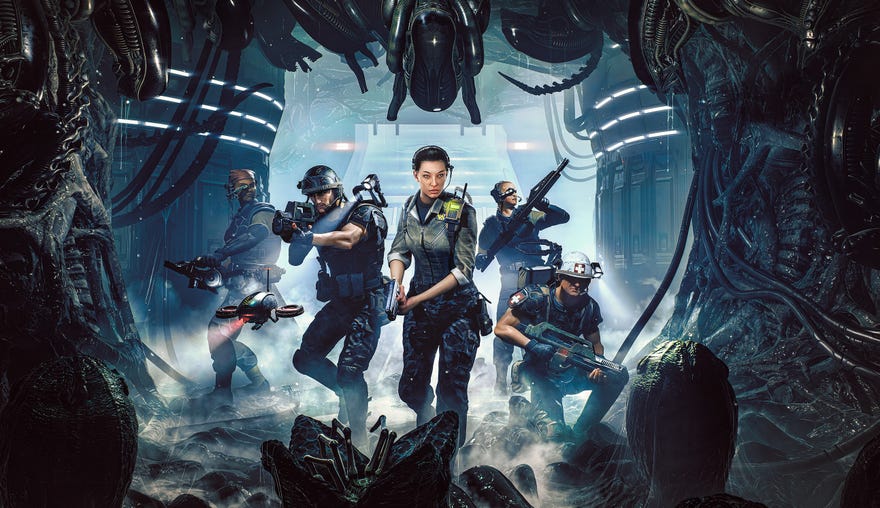Aliens: Dark Descent review: decent, if desperate to sit with the cool console kids
What if XCOM but with aliens?
In the same way that Alien: Isolation is, for many, now the definitive Ridley Scott’s Alien game, I’ve got no problem getting all ‘game critic who wants to feel important by making wild declarative statements’ and saying that Aliens: Dark Descent is now, for me at least, the definitive James Cameron’s Aliens game. It’s the first to really capture the white-knuckle vibe of setting up perimeters, quipping out that last line of top-tier banter you’ve been saving, and seeing the shapes on the motion tracker creep closer and squeal louder. It really does do the license justice, so if that’s what you’re looking for, dig in. I just wish it trusted me to be able to count higher than one. Not that much higher, either. Just four.
Dark Descent is not a game for strategy game fans nearly as much as it’s one for Aliens fans. You order your entire squad around at the same time, pausing or slowing time to issue commands like grenades or suppressive fire, using a stock of command points that refill over time. It’s a game that’s (rightly) decided that a very particular type of strategy game is the best format to convey Aliens’ whole schtick, but then seems to have realised, hang on, we’re at risk of (alien) isolating and possibly even (alien)ating a lot of potential customers here. What if there was a way to do XCOM but without all the knobbly bits?
By XCOM, I mean 2012’s XCOM, a game I love dearly, but one that has already been deliberately and surgically scoured of said knobbles. Look. Consoles are great. I love them. I have a tablet holder attached to my bed frame so I can play Switch lying down. But when you further console-ise an already console-ised tactics game, you’re deliberately limiting the sort of stories it can tell and choices it can offer, seemingly in service of the sort of immediacy and momentum that works well for the first few hours, but soon reveals itself to be as suffocatingly restrictive as an especially affectionate face hugger on a half gram of Molly.
It’s the apparent disdain for “micromanagement” that’s done it. Instead of controlling each member of your squad of four marines individually, you control them all as a single unit, with the game using its “state of the art thinking-is-for-nerds priority system” or whatever the trailers called it, to decide which marine is best equipped at any given moment to do the specific task you want doing. Need to heal a marine, and it’ll pick your medic, if you have one. Need to open a crate or weld a door shut, and it’ll pick the closest unoccupied marine. Want to have three of your marines stay behind cover ready to fire, and one of your marines edge towards an automatic door just close enough for it to open and give you a clear shot at whatever’s lurking behind it? Whoa, slow down there, Sun Tzu! Any more hysterics out of you and we might have to grab the icepick and hammer! You’ll move as a squad, and you’ll like it.
.jpg?width=690&quality=80&format=jpg&auto=webp)
.jpg?width=690&quality=80&format=jpg&auto=webp)
.jpg?width=690&quality=80&format=jpg&auto=webp)
This tendency towards streamlining also rears its ugly little mouth-on-a-stick in both the campaign and mission structure. Generally, tactics games have you solve some gradient of procedural threats, whether that be the almost fully procedural puzzle box of an Into the Breach, or the semi-procedural of an XCOM, where enemy placement and AI all factor into the game being able to vomit up unique scenarios. There’s some of this in Dark Descent, but a focus on set pieces and a sort of pre-scripted intensity curve for each mission means that, texturally, the game plays more like an action-adventure than what you’d traditionally expect from a turn-based campaign with a strategy layer. This is exemplified by the fact that there’s a real lack of optional excursions to add texture to the campaign experience outside of a linear path of progression.
This is all a personal gripe, though. So, let’s talk about all the things Aliens: Dark Descent does well, because there’s a lot of it. Ultimately, this is a very impressive bit of video game held back by what I consider an egregious design choice, so if that choice doesn’t bother you personally, I reckon you’re in for a bit of a treat. Firstly, even within the limited campaign structure, there’s still plenty of juicier, more granular elements to play with. Marines get stressed out and develop psychological disorders. They get wounded, sometimes to the point where they can’t run or use rifles. You can spend time healing them, or training them. You can develop new weapons and abilities and xeno-tech. Timers tick by, both in mission and on the strategy layer, amping up the intensity of alien attacks.
"Dark Descent’s greatest strengths lie not so much in its nuts and bolts of design, but more in what a well-produced bit of Aliens media it is"
This plays into one of the cooler things the game does, which is to have persistent progress in each mission. It’s unlikely you’ll finish these missions on a single deployment, especially as it’s a very bad idea to stick around once the alien threat ramps up to ‘hard’. Xenomorph encounters usually come in three types. There’s the odd wandering or occasional sleeping drone that, if alerted, can initiate a ‘hunt’, where you’ll be periodically attacked by small groups of aliens while a timer ticks down. Then, there’s ‘onslaughts’: huge waves of xenos that give you a twenty-or-so second warning for you to set up sentry guns and suppressive fire cones. The longer you spend in a given deployment, the more frequent and deadly these things get, with new and terrifying aliens appearing to headbutt you to death. So, instead, you make as much progress as you can toward your objectives, but any sentry guns you lay down, or crates you open, or doors you weld to create shelters (temporary rest spots that destress your marines), remain in play for the next deployment. There’s also permadeath for your marines, natch.

.jpg?width=690&quality=80&format=jpg&auto=webp)
.jpg?width=690&quality=80&format=jpg&auto=webp)
But Dark Descent’s greatest strengths lie not so much in its nuts and bolts of design, but more in what a well-produced bit of Aliens media it is. If you’ve played Tindalos Interactive’s Battlefleet Gothic games, you’ll know that atmosphere and satisfying, chunky feeling action are huge strengths of theirs. My most memorable moments with the game were never pulling off some supremely tactical play, but instead creeping through the lightless corridors of abandoned Weyland Yutani sites, flashlights bouncing off bulkheads, the only sounds being the careful footsteps of my squad, and that iconic, terrifying motion tracker beep. The game makes the very smart decision to limit not only healing items, but also ammo clips. That’s Aliens to me, genuine survival horror punctuated by bursts of intense, terrifying violence. Dark Descent pulls it off masterfully.
I absolutely can’t blame Tindalos for wanting a game with such a recognisable and beloved license to court appeal outside of genre fans, but I also think that if you’re going to make a strategy game, you should probably make it full-heartedly. 2012’s XCOM felt like a genuine revolution in turn-based tactics, but Aliens: Dark Descent too often feels like a compromise, or, more accurately, a console-mise. If you’re thinking, wow, what a snob, then, congratulations. You get to enjoy something more fully than I did, which is much better than griping about things. Dark Descent is beautiful, engaging, and absolutely drips with authentically atmospheric Aliens goo. But, again, like those face huggers, it’s also just a bit too restrictive, and I don’t think it needed to be.
This review is based on a review build of the game provided by the publisher Focus Entertainment.


